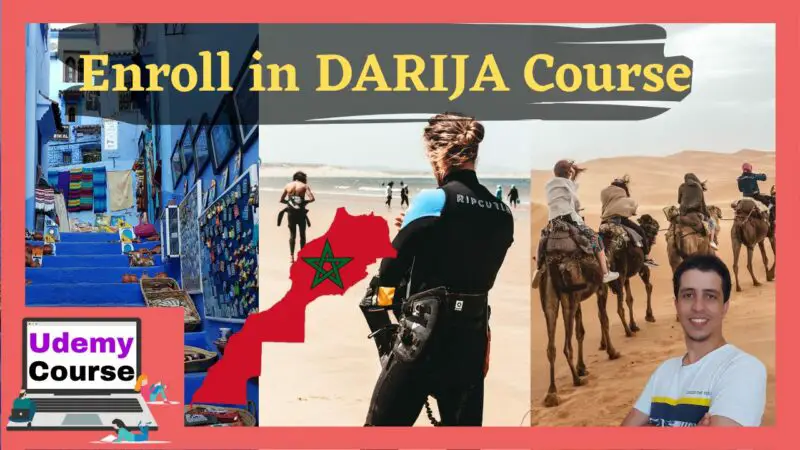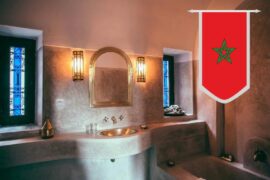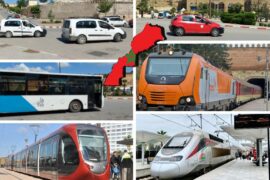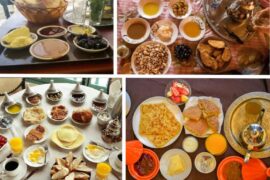As a visitor or a foreign resident in Morocco, especially if you are interested in the Moroccan culture and having easy daily conversations with locals, knowing some useful expressions in Moroccan Arabic will be very helpful. The transcription adopted in all Darija vocabulary and expressions mentioned in this article is the one adopted by Moroccans and influenced by the French language. For example, if Moroccans exchange messages on WhatsApp, they will write “Inchallah” and not “Inshallah” (For the “SH” sound in English they use “CH” like in French).
To learn DARIJA, you can enroll in our Online DARIJA Classes available on UDEMY with detailed explanations, step-by-step pronunciation and we remain always available for all your questions on the Udemy platform. You will have lifetime access to the course which is always updated with new DARIJA lessons.
Greeting Expressions in Moroccan Arabic
In this section, you have the transcription of the Darija expressions with the pronunciation.
How To Say Hello In Moroccan Arabic?
Salam / Salamo 3alaykom = Hello / Hi.
Salam = Peace.
Salamo 3alaykom = Peace be upon you.
The Possible answers:
Salam / Wa 3alaykom Salam
Wa 3alaykom Salam = And Peace be upon you.
How To Say Good Morning In Moroccan Arabic?
Sba7 Lkhir = Good Morning.
The answer:
Sba7 Nour ( it’s like you wish him/her a Bright Morning).
Vocabulary translated in English:
Sba7 = Morning (the original word is ” الصباح ” which means ” Morning in Standard Arabic).
Lkhir = The Good.
Nour = Light.

How To Say Good Evening In DARIJA?
Msa Lkhir = Good Evening.
The answer:
Msa Nour ( it’s like you wish him/her a bright Evening).
Vocabulary translated in English:
Msa = Evening (the original word is ” المساء ” which means “Evening” in Standard Arabic).
Nour = Light.
How are you in Moroccan Arabic(DARIJA)
How To Say How Are You?
Kidayr? = how are you? ( Addressing a Man )
Kidayra? = how are you? ( Addressing a Woman)
Labas? = how are you? ( Addressing both Man or Woman)
How To Respond To How Are You?
Some Possible answers:
Labas = Fine / Good.
Labas, L7amdolillah = Fine/Good, Praise be to god.
Bikhir = Very Good.
Bikhir, L7amdolillah = Very Good, Praise be to god.
Thank you in Moroccan Arabic(Darija)
How To Say Thank You?
Chokran = Thank you.
Chokran Bzzaf = Thank you so much.
How To Respond To Thank You?
Some possible answers:
La Chokran 3ala lwajib = No thanks for the duty.
L3afw = a Pardon.
More Useful Expressions in Moroccan Arabic
In this section, you have a list of some expressions and vocabulary you may need in your daily conversations in Morocco:
L7amdolillah = Praise be to god.
Mar7ba Bik = you are welcome ( Addressing one person ).
Mar7ba Bikoum = You are welcome ( Addressing 2 persons or more ).
Sma7 li = Sorry / Excuse me ( Addressing a Man ).
Sam7i li = Sorry / Excuse me ( Addressing a Woman ).
3afak = Please.
La = No.
Ah, yeh = Yes.
Wah = Yes (Especially in the Northeast of Morocco like Oujda, Berkane,..etc).
Wakha = Ok.
7chouma = Shame on you.
Sir F7alk = Go away (Addressing a Male).
Siri F7alk = Go away (Addressing a Female).
Machi mochkil = It’s not a problem.
Kayn Mochkil = There is a problem.
Makayn Mochkil = There is no problem.
3awni 3afak = Help me, please.
Fhamti? = do you understand? (For both genders).
/ Wach Fhamti? = do you understand? (For both genders).
If you understand, you can answer:
Fhamt = I understand (with an affirmative tone).
Ah, Fhamt = Yes, I understand.
La, Mafhamtch = No, I do not understand.
3awd 3afak = Repeat, please.
Walo = nothing.
Ma3raft / Ma3raftch = I don’t know/I’m not sure.
Kayn …. ? = is there … ? (Asking about something with a masculine name).
Kayna …? = is there … ? (Asking about something with a feminine name).
In case you are inside a shop, for example, saying Kayn/Kayna … ? is like you are saying: Do you have … ?)
3ndk … ? = Do you have (Sing)? (For both genders).
3ndkoum … ? = Do you have(Plur)?.
There are much more vocabulary, expressions, and phrases to learn in Moroccan Arabic. Mentioned examples, deserve to be memorized and practiced for more facilities in your daily conversations in Morocco.
For more Moroccan Arabic courses, you can check this website.



